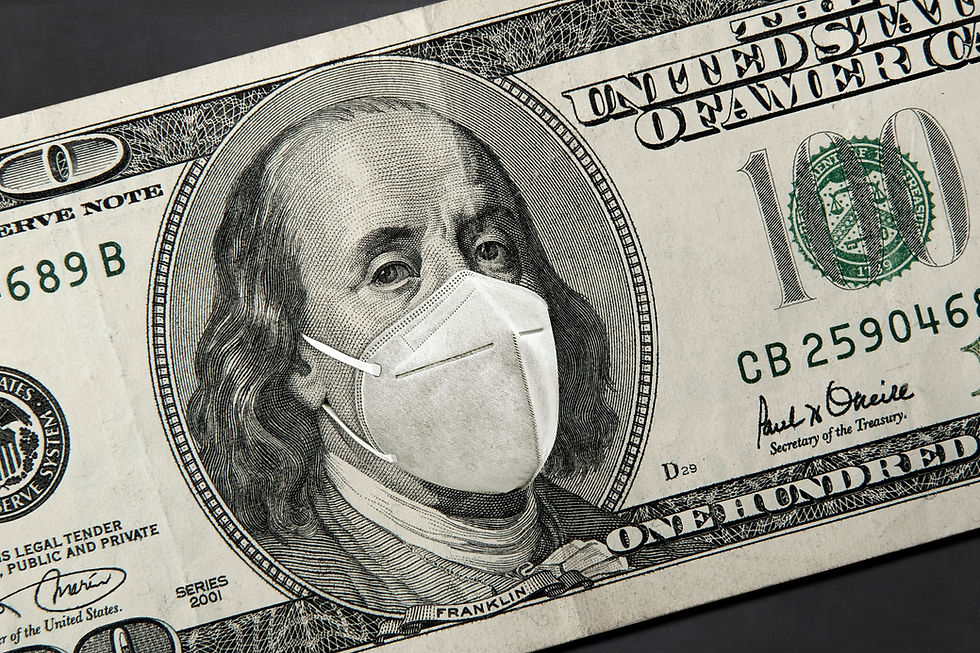The Sunsetting of the Temporary, COVID-19 Federal Bankruptcy Relief
- RL Johnson
- May 1, 2022
- 2 min read
Updated: May 2, 2022
by Christian, civil trial attorney, RL Johnson

At the onset of the COVID-19 pandemic, this blog did a series of informational videos concerning the Coronavirus Aid, Relief, and Economic Security (“CARES”) Act of 2020. The CARES Act was passed by Congress on March 25, 2020, and signed into law by President Trump on March 27, 2020.
The CARES Act—which was consolidated with the Coronavirus Response and Consolidated Appropriations Act of 2021—provided fast and direct economic assistance for American workers, families, small businesses, and industries.
As it related to the federal Bankruptcy Code, the CARES Act provided temporary small businesses and individual debtors with expanded access to bankruptcy relief. This expanded relief included:
an increase in the debt limit from $2,725,625.00 to $7,500,000.00 for a person engaged in a commercial business who chose to file a Chapter 11 bankruptcy petition as a small business debtor[i];
an exclusion from the definition of “income” payments made under Federal law relating to the national COVOD-19 emergency for chapters 7 and 13, which had the collateral consequence of excluding COVID-19 relief payments from the calculation of disposable income for Chapter 13 plan confirmation purposes [ii];
permission for a debtor to modify a plan confirmed prior to the enactment of the CARES Act if the debtor experienced a material financial hardship due, directly or indirectly, to the COVID-19 pandemic[iii]; and,
an extension of the installment payment period to seven years[iv].
These provisions were intended to sunset on March 27, 2021, but were extended that same day when President Biden signed into law the COVID-19 Bankruptcy Relief Extension Act of 2021,[v] which again extended the temporary CARES Act provisions to March 27, 2022.
However, on March 27, 2022, the above-mentioned temporary, expanded relief sunsetted, which had the effect of returning Chapters 7, 11, and 13 of the Bankruptcy Code to their pre-COVID-19 rules.
That said, it is crucial for Christians to remember that although these government dispensations have expired, we should be strong and courageous. We should not be frightened or dismayed, for the Lord our God is with us as we continue to endure troubling times. Joshua 1:9.
ENDNOTES
[i] CARES Act §1113(a)(1). Compare 11 U.S.C. § 1182(1).
[ii] CARES Act §1113(b)(1)(a)(iii). Compare 11 U.S.C. §§ 1115, 1123(a)(8), 1129(a)(15).
[iii] CARES Act §1113(d)(1)(A). Compare 11 U.S.C. §1127(a)
[iv] CARES Act §1113(b)(2). Compare the pre-COVID-19 rule, which permitted a debtor to confirm over a creditor's objection without committing all of the debtor's disposable income over five years unless the plan pays the claim in full, with interest, over a shorter period of time. 11 U.S.C. §§ 1115, 1123(a)(8), 1129(a)(15).
[v] Pub L No 117-5, 135 Stat 249 (Mar. 27, 2021) (H.R. 1651)
Helpful Links:
• Christian Legal Society
https://www.christianlegalsociety.org
• The Library of Congress’ website:
https://www.loc.gov/law/help/guide/states.php
• Civil Pro Se Forms
https://www.uscourts.gov/forms/civil-pro-se-forms
• Federal Rules of Civil Procedure
https://www.uscourts.gov/rules-policies/current-rules-practice-procedure/federal-rules-civil-procedure
• Public Access to Court Electronic Records (“PACER”) system
Disclaimer: The information contained in this video is offered for educational purposes only and is not intended to substitute for legal advice and is not customized to your particular needs. Before undertaking self-representation, we urge you to consult with an attorney licensed to practice in your state.







Comments